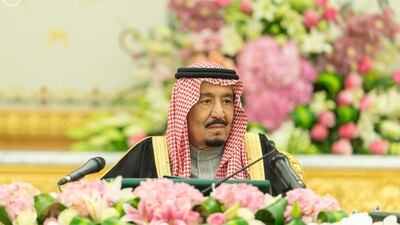Saudi Arabia has cut investment spending by almost two thirds as it wrestles with the oil price rout.
Spending on transport and infrastructure will fall 63 per cent in 2016, as the kingdom axes capital expenditures in a bid to trim next year’s deficit.
Funds for projects, such as the Riyadh Metro and Jeddah’s King Abdulaziz International Airport, fall to 23 billion Saudi riyals in 2016, down from 63bn riyals this year.
Spending on public sector wages was 450bn riyals in 2015, just under half of all government spending.
The overall budget has also taken a cut. Saudi Arabia plans to spend 840bn riyals next year, a cut of 2.3 per cent against its 2015 budget allocation of 860bn riyals. It plans to run a deficit of 326bn riyals – equivalent to about 16 per cent of GDP, according to National Bank of Abu Dhabi calculations.
The kingdom also announced on Monday that it had run a deficit of 367bn riyals in 2015, equal to about 15 per cent of GDP according to Reuters figures and significantly below the IMF’s estimate of 21 per cent.
Hindi Al Suhaimi, a government adviser, said that the kingdom’s budget deficit fell as a result of “some procedures” to cut spending taken by the government.
While the country’s 2016 budget is marginally lower than its 2015 allocation, the government has repeatedly overshot its budget allocations in previous years.
This year, the kingdom overshot its budget allocation by 13 per cent, actually spending 975bn riyals, 115bn riyals more than its 860bn riyals budget allocation.
The Saudi budgetary procedures have come under scrutiny as government departments find themselves regularly exceeding their spending targets.
The finance ministry clawed back unspent money held in government departments earlier this year to reduce the deficit.
The budget saw the government introduce a new, specialised “public finance unit” in the finance ministry, responsible for ensuring adherence to government spending targets.
“Subsidy reform is being considered, VAT is being considered – Saudi Arabia is still considering these things, but they will probably overshoot their budget estimates” again in 2016, said Alp Eke, the chief economist at the National Bank of Abu Dhabi.
The collapse in oil to an 11-year low last week of $35.98 – down from a high of more than $110 per barrel in 2014 – has hit the oil exporter hard.
Saudi Arabia did not announce an estimate for the oil price it expected next year, but Mr Eke said that the kingdom is assuming an oil price of about $55 per barrel.
The country has liquidated foreign assets held at the central bank and its sovereign wealth funds to plug the fiscal deficit. Mr Eke estimates that Saudi Arabia has depleted approximately $150bn of assets during the past year.
The kingdom has also tapped local bond markets and, for the first time in its history, will issue bonds outside its borders next year.
Saudi Arabia has led Opec member states in keeping the cartel pumping oil, even as global demand weakens amid a global economic slowdown and depressed growth in China.
The aim is to slow or prevent investment in new hydrocarbons capacity, to shore up Saudi Arabia’s oil market share.
Nouriel Roubini, the NYU economist credited with predicting the 2008 financial crisis, told The National this month that the plan would probably only be "partially successful", as low-cost shale producers find it possible to stay in business.
But the economic pain at home has mounted as the oil price continued to fall, hitting government revenues and slowing Saudi Arabia’s economy.
Details from the budget reveal a range of economic reforms during the next five years. This will include privatisations in “a range of sectors and economic activities”, climate reform, improved “transparency and accountability” and more public-private partnerships.
The consultancy firm McKinsey said that Saudi Arabia faced a mammoth task to create enough jobs to cope with a booming population amid the oil price rout.
abouyamourn@thenational.ae
Follow The National's Business section on Twitter

